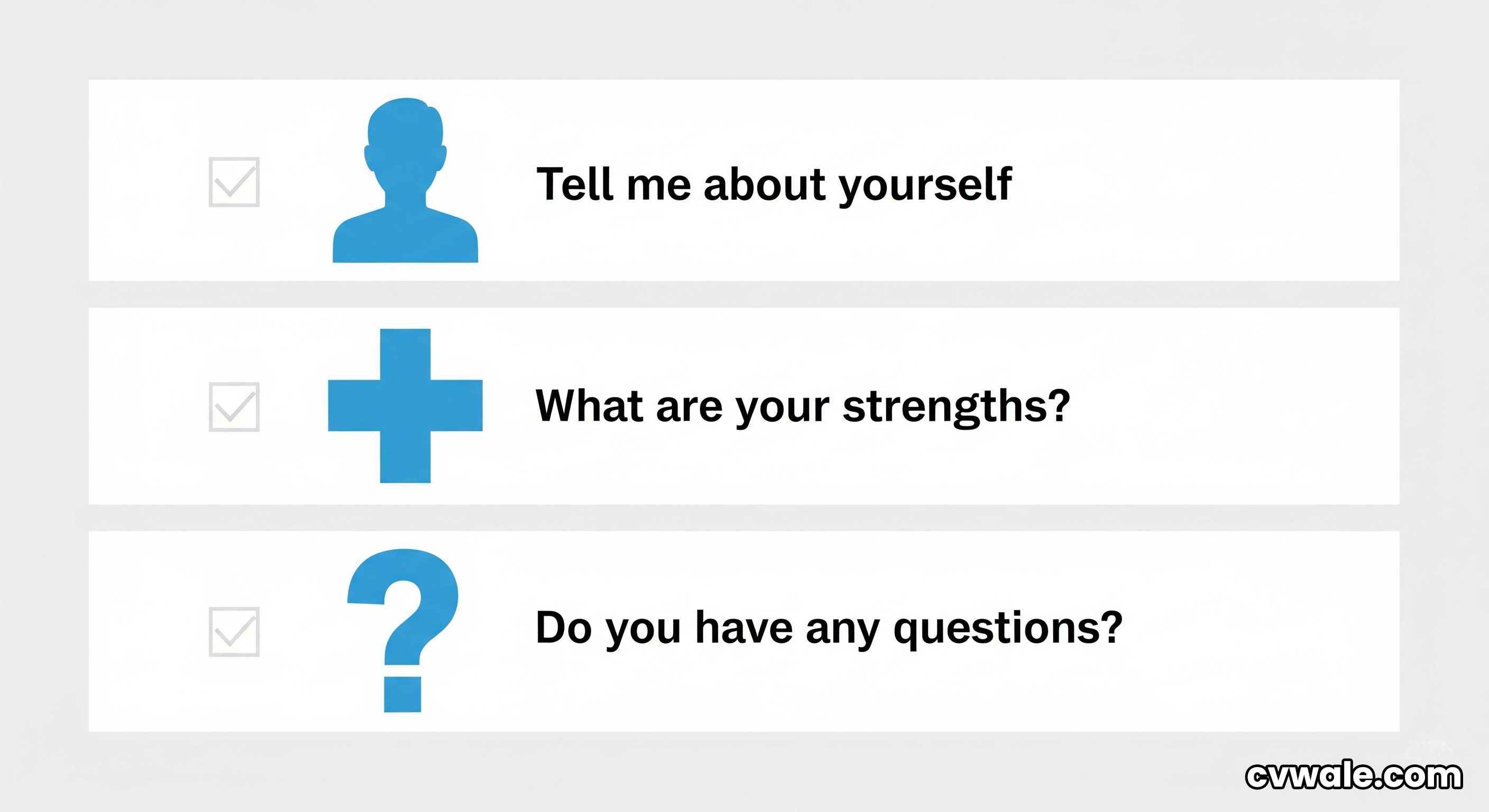Top 10 Common Interview Questions in India (with Sample Answers)

Congratulations! Your powerful CV, created with a tool like CVWale, has successfully landed you a job interview. This is a huge achievement, but the work isn't over. The interview is your chance to bring your CV to life, showcase your personality, and convince the hiring manager that you are the absolute best candidate for the role. While every interview is different, there are a handful of common questions that are almost guaranteed to come up, especially in the Indian job market. Preparation is the key to transforming interview anxiety into confidence. This guide will break down the top 10 most common interview questions, explain what the recruiter *really* wants to know, and provide you with effective strategies and sample answers to help you ace your next interview.
1. "Tell me about yourself."
What they're really asking: This isn't an invitation to share your life story. It's a test of your communication skills and a chance for you to give a concise, professional summary of who you are. They want to hear your career elevator pitch.
How to answer: Use the "Past-Present-Future" formula. Briefly touch upon your relevant past experience (Past), describe your current role and accomplishments (Present), and explain why you are excited about this specific opportunity and what you hope to achieve (Future).
Sample Answer: "For the past five years (Past), I've been working as a Digital Marketing Manager, focusing on SEO and content strategy. In my current role at XYZ Corp (Present), I led a campaign that increased our organic traffic by 150%. I'm now looking to leverage my expertise in a larger, more strategic role, and I'm particularly excited about [Company Name]'s innovative work in the fintech space (Future)."
2. "What are your strengths?"
What they're really asking: "Do your strengths align with the needs of this job?" They want to see if you're self-aware and if your best qualities are relevant to the role.
How to answer: Pick 2-3 of your top strengths that are directly mentioned in the job description. For each strength, provide a brief, specific example that proves it.
Sample Answer: "One of my key strengths is problem-solving. In my previous project, we were facing a recurring bug that was impacting user experience. I took the initiative to analyze the codebase, identified the root cause, and implemented a fix that reduced user-reported issues by 40%. This ability to diagnose and solve problems is something I believe would be very valuable in this role."
3. "What are your weaknesses?"
What they're really asking: "Are you self-aware, honest, and willing to improve?" They are also checking for any major red flags.
How to answer: Choose a real, but not critical, weakness. Most importantly, explain what steps you are actively taking to improve it. Avoid clichés like "I'm a perfectionist" or "I work too hard."
Sample Answer: "In the past, I sometimes found it challenging to delegate tasks, as I wanted to ensure everything was done perfectly. However, I've learned that this can slow down the team. I've since taken a course on effective delegation and have been actively practicing trusting my team members with more responsibility, which has improved our overall productivity."

4. "Why do you want to work for this company?"
What they're really asking: "Have you done your research? Are you genuinely interested in us, or are you just looking for any job?"
How to answer: This is where your research shines. Mention something specific about the company—their mission, a recent project, their company culture, a product you admire, or their position in the industry.
Sample Answer: "I've been following [Company Name]'s journey for a while, and I was particularly impressed with the launch of your [Product Name] last year. I admire the company's commitment to sustainability and its innovative approach to solving [specific problem]. I believe my skills in [Your Skill] would align perfectly with the values and goals of your team."
5. "Where do you see yourself in 5 years?"
What they're really asking: "Are you ambitious? Do your long-term goals align with what this company can offer? Are you planning to stay, or will you leave in a year?"
How to answer: Be ambitious but realistic. Show that you want to grow within the company.
Sample Answer: "In five years, I hope to have become an expert in this field and have taken on more leadership responsibilities. I am excited by the potential for growth at [Company Name], and I see myself contributing to more significant, high-impact projects and potentially mentoring junior team members."
6. "Why should we hire you?"
What they're really asking: This is your chance to sell yourself. "Connect the dots for us. Why are you the best candidate out of everyone we're interviewing?"
How to answer: Summarize your top 3 qualifications and connect them directly to the job description.
Sample Answer: "Based on the job description, you're looking for someone with expertise in Java, cloud platforms, and agile methodologies. With my 6 years of experience, my AWS certification, and my proven track record of delivering projects in a fast-paced agile environment, I am confident that I have the precise skill set you need to succeed in this role from day one."
7. "Tell me about a time you faced a conflict with a coworker."
What they're really asking: "How do you handle interpersonal challenges? Are you a team player?"
How to answer: Use the STAR method (Situation, Task, Action, Result). Focus on the professional and positive resolution, not the drama.
Sample Answer: "(Situation) In a previous project, a colleague and I had a disagreement on the best technical approach to a problem. (Task) Our goal was to find the most efficient solution without delaying the project timeline. (Action) I scheduled a meeting where we both presented our viewpoints with data to back them up. We listened to each other's perspectives and decided to combine the best elements of both our ideas. (Result) This collaborative approach led to a more robust solution, and our professional relationship grew stronger."
8. "Why are you leaving your current job?"
What they're really asking: "Are you leaving on good terms? Are there any performance issues?"
How to answer: Never, ever speak negatively about your previous employer. Stay positive and focus on the future.
Sample Answer: "I've learned a great deal in my current role and I'm grateful for the opportunities I've had. However, I'm now looking for a new challenge where I can take on more responsibility and further develop my skills in [specific area], and this role at your company seems like the perfect next step in my career path."
9. "What are your salary expectations?"
What they're really asking: "Can we afford you? Do you know your market value?"
How to answer: Do your research beforehand on sites like Glassdoor or AmbitionBox for the market rate in India for that role. Provide a reasonable salary range, not a single number.
Sample Answer: "Based on my research for a role with this level of responsibility in this industry, I'm expecting a salary in the range of ₹X to ₹Y lakhs per annum. However, I am flexible and open to discussing this further, as the opportunity to grow with a company like yours is my main priority."
10. "Do you have any questions for us?"
What they're really asking: "How interested and engaged are you?"
How to answer: The answer should always be "Yes!" Prepare 2-3 thoughtful questions beforehand.
Good Questions to Ask: "What does a typical day look like in this role?" "What are the biggest challenges the team is currently facing?" "How do you measure success for someone in this position?"
Answering these questions confidently can make all the difference. Remember to practice your answers, but don't memorize them like a script. Let your personality shine through. A great interview is the final, crucial step that begins with a great CV.
